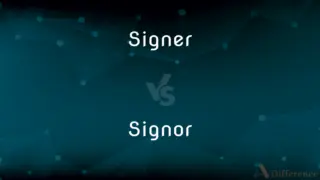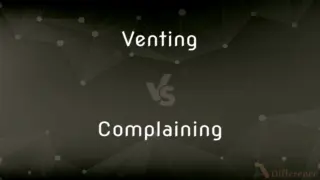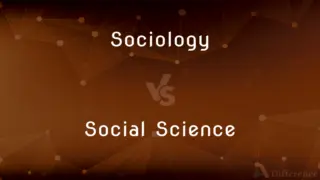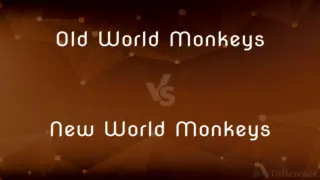Endure vs. Perdure — What's the Difference?
By Tayyaba Rehman & Maham Liaqat — Updated on May 4, 2024
"Endure" means to withstand difficult conditions over time, while "perdure" emphasizes continuing or lasting indefinitely without significant change.

Difference Between Endure and Perdure
Table of Contents
ADVERTISEMENT
Key Differences
Endure typically implies resilience and the ability to withstand adversity or discomfort over a period of time. Whereas, perdure is more about lasting perpetually, often used to describe enduring concepts or conditions without end.
When someone chooses to endure, it often involves a conscious effort to face challenges or sustain through tough times. On the other hand, when something perdures, it continues to exist or remain in the same state naturally or inherently.
Endure is commonly used in both physical and metaphorical contexts, like enduring pain or hardship. Whereas, perdure is less common and typically found in more formal or literary contexts, suggesting an ongoing, unchanging state.
In literature, characters may endure hardships in order to grow or achieve something. Whereas, certain themes or emotions in the narrative may perdure, indicating their constant presence throughout the story.
The capacity to endure can change over time, potentially weakening or strengthening depending on circumstances. Whereas, to perdure implies a consistent state, unchanged by external forces.
ADVERTISEMENT
Comparison Chart
Meaning
Withstand adversity
Continue indefinitely
Usage
Common, versatile
Rare, formal
Context
Both physical and emotional
Mostly abstract or conceptual
Temporal Aspect
Temporary, though potentially long
Perpetual, without end
Implication
Resilience, effort involved
Inherent continuity, no change
Compare with Definitions
Endure
To remain in existence; last.
These ancient ruins have endured through centuries.
Perdure
To last for a long time; endure over time.
The fundamental principles of democracy tend to perdure.
Endure
To tolerate or put up with something or someone.
It's hard to endure the noise all day.
Perdure
To continue without change; persist.
The artist’s early themes perdure in all his later works.
Endure
To continue to exist in the same state or condition.
He endured in his job despite the difficulties.
Perdure
To remain constant or unchanged.
His loyalty to his friends will perdure any challenges.
Endure
To withstand the effects of time or change.
The legend of their heroism has endured beyond their lifetimes.
Perdure
Used in literary contexts to imply everlasting.
The beauty of this poem will perdure throughout the ages.
Endure
To suffer (something painful or difficult) patiently.
She had to endure a long wait before hearing the news.
Perdure
To exist perpetually.
The values instilled in him by his mentor will perdure.
Endure
Endure is a 2010 crime thriller film directed and written by Joe O'Brien. It stars Judd Nelson, Devon Sawa, Tom Arnold and Joey Lauren Adams.
Perdure
To last permanently; endure.
Endure
To carry on through, despite hardships; undergo or suffer
Endure an Arctic winter.
Perdure
(intransitive) To continue to exist, last or endure, especially for a great length of time.
Endure
To put up with; tolerate
I cannot endure your insolence any longer.
Perdure
To exist in such a way as to possess distinct temporal parts (in perdurantism).
Endure
To continue in existence; last
Buildings that have endured for centuries.
Perdure
To last or endure for a long time; to be perdurable or lasting.
The mind perdures while its energizing may construct a thousand lines.
Endure
To suffer patiently without yielding.
Endure
(intransitive) To continue or carry on, despite obstacles or hardships; to persist.
The singer's popularity endured for decades.
Endure
(transitive) To tolerate or put up with something unpleasant.
Endure
(intransitive) To last.
Our love will endure forever.
Endure
To remain firm, as under trial or suffering; to suffer patiently or without yielding; to bear up under adversity; to hold out.
Endure
(transitive) To suffer patiently.
He endured years of pain.
Endure
(obsolete) To indurate.
Endure
To continue in the same state without perishing; to last; to remain.
Their verdure still endure.
He shall hold it [his house] fast, but it shall not endure.
Endure
To remain firm, as under trial or suffering; to suffer patiently or without yielding; to bear up under adversity; to hold out.
Can thine heart endure, or can thine hands be strong in the days that I shall deal with thee?
Endure
To remain firm under; to sustain; to undergo; to support without breaking or yielding; as, metals endure a certain degree of heat without melting; to endure wind and weather.
Both were of shining steel, and wrought so pure,As might the strokes of two such arms endure.
Endure
To bear with patience; to suffer without opposition or without sinking under the pressure or affliction; to bear up under; to put up with; to tolerate.
I will no longer endure it.
Therefore I endure all things for the elect's sake.
How can I endure to see the evil that shall come unto my people?
Endure
To harden; to toughen; to make hardy.
Manly limbs endured with little ease.
Endure
Put up with something or somebody unpleasant;
I cannot bear his constant criticism
The new secretary had to endure a lot of unprofessional remarks
He learned to tolerate the heat
She stuck out two years in a miserable marriage
Endure
Face or endure with courage;
She braved the elements
Endure
Continue to live; endure or last;
We went without water and food for 3 days
These superstitions survive in the backwaters of America
The racecar driver lived through several very serious accidents
Endure
Undergo or be subjected to;
He suffered the penalty
Many saints suffered martyrdom
Endure
Last and be usable;
This dress wore well for almost ten years
Endure
Persist or be long; in time;
The bad weather lasted for three days
Endure
Continue to exist;
These stories die hard
The legend of Elvis endures
Common Curiosities
Is perdure commonly used in everyday conversation?
No, perdure is more formal and less common than endure.
What is an example of enduring hardship?
Enduring hardship can involve dealing with severe illness or overcoming financial struggles.
Can an emotion perdure?
Yes, emotions or states like love or grief can be described as perduring if they continue unchanged.
How is perdure different from endure?
Perdure implies a continuous, unchanging state, lasting indefinitely, while endure refers to withstanding temporary conditions.
What does it mean to endure something?
It means to withstand or tolerate adversity or discomfort over time.
Why might a writer choose to use perdure instead of endure?
To emphasize the unchanging, everlasting nature of a concept or state.
How can a company’s values perdure?
Through consistent reinforcement and practice over generations.
Can a building endure harsh weather?
Yes, buildings can be constructed to endure harsh conditions like storms or earthquakes.
Does endure always imply a negative experience?
While often associated with difficulties, endure can also refer to surviving or lasting through any condition.
What types of things are said to perdure?
Principles, values, or natural conditions are often described as perduring.
What literary figures are known for their ability to endure?
Characters in classic literature like Job in the Bible or Odysseus in Greek mythology are famous for enduring great trials.
Share Your Discovery

Previous Comparison
Oscilloscope vs. Voltmeter
Next Comparison
Rag vs. TowelAuthor Spotlight
Written by
Tayyaba RehmanTayyaba Rehman is a distinguished writer, currently serving as a primary contributor to askdifference.com. As a researcher in semantics and etymology, Tayyaba's passion for the complexity of languages and their distinctions has found a perfect home on the platform. Tayyaba delves into the intricacies of language, distinguishing between commonly confused words and phrases, thereby providing clarity for readers worldwide.
Co-written by
Maham Liaqat














































